Introduction
Are you tired of automating repetitive boring and manual marketing tasks? If so, now it is easier with AI chatbot for website than ever before.
According to Juniper Research, chatbots will help brands save over $11 billion per year by 2023. While businesses are busy heralding the human touch as the cornerstone of customer service, AI chatbot for website silently revolutionize the approach to digital interactions.
Per Mordor Intelligence, the marketing automation software market is projected to reach $16 billion by 2027. Amidst this backdrop, the smart integration of AI chatbot for website has become a game-changer in marketing automation for websites.
In a market flooded with ever-evolving tech, leveraging marketing automation with AI chatbot for website provides a reliable means to stay ahead, simplifying tasks, and engaging your audience like never before.
In this article, you shall explore how AI chatbot for website helps you to stay ahead of the marketing automation curve.
How AI chatbot for website Can Power Up Your Marketing Automation?
AI chatbot for website have significant capabilities to streamline tasks, generate leads, and provide round-the-clock customer support. Let’s explore ways in which AI chatbot for website can help you leverage marketing automation :
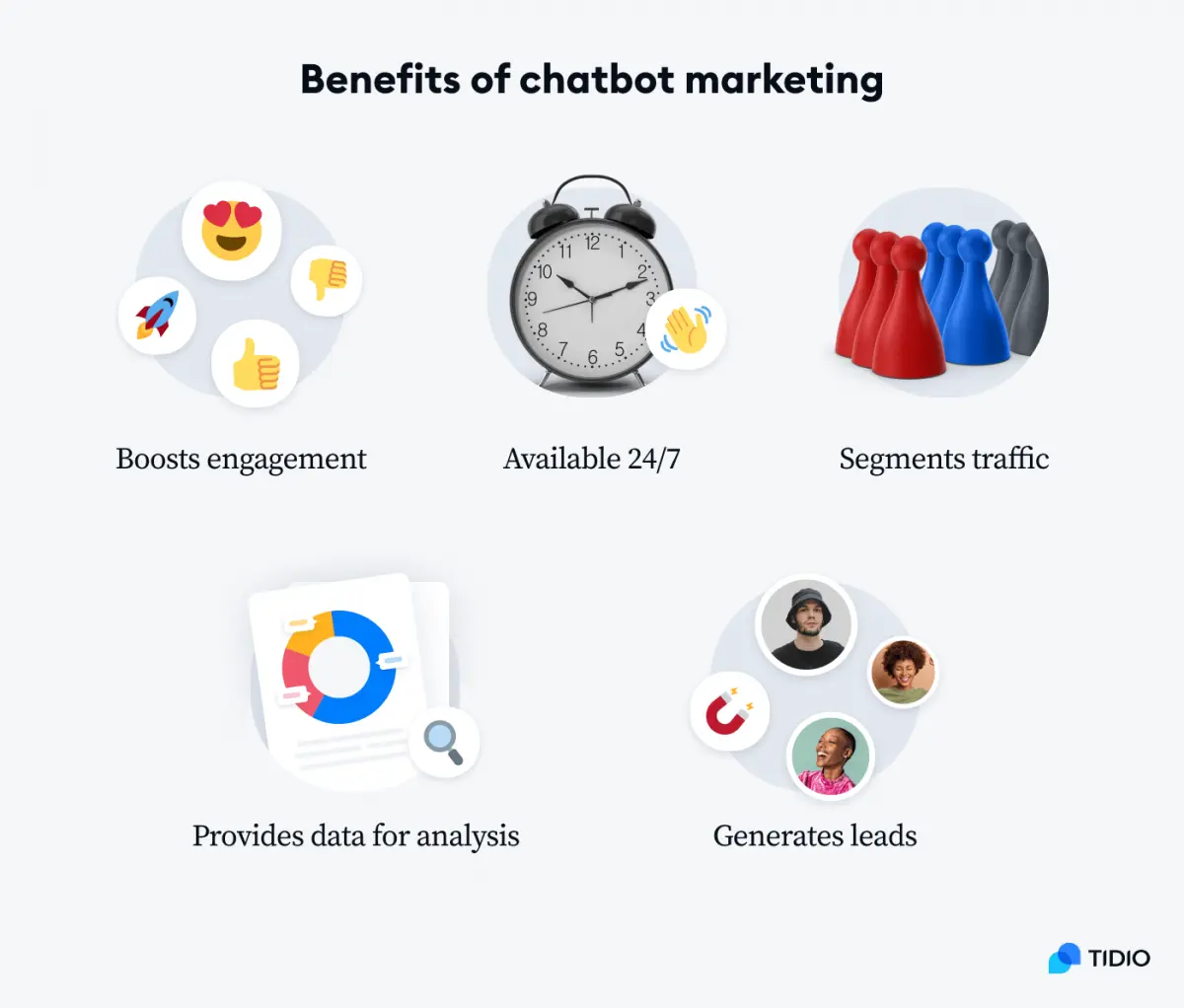
Lead Generation & Qualification
AI chatbot for website has enormous capabilities for lead generation. Let us see how :
24/7 Lead Capture: AI chatbots for website are available around the clock, enabling businesses to capture leads at any hour of the day without human intervention. This ensures no potential lead is missed due to time constraints.
Conversational Engagement: By initiating engaging conversations, AI chatbot for website make the lead generation process interactive and less intrusive, encouraging visitors to share their information more willingly.
Personalized User Experience: Based on the user's responses and interaction, AI chatbot for website offer personalized content and recommendations.
Direct Scheduling: Integration of scheduling tools allows AI chatbot for website to book appointments, demos, or consultations directly through the chat interface.
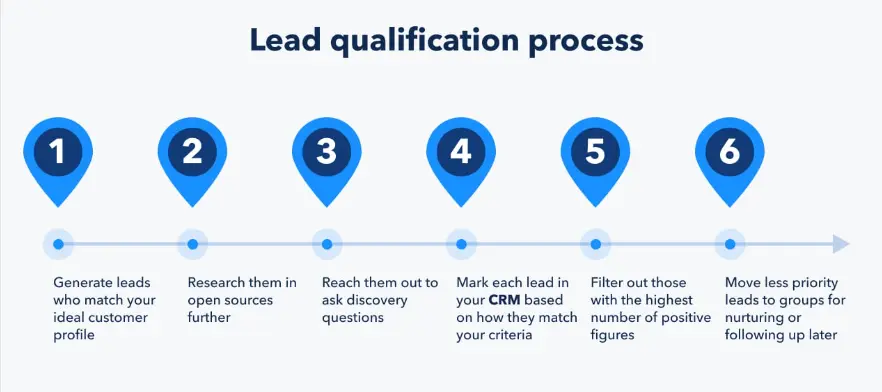
Use Cases and Real-Life Examples
Let’s see some real-world examples where AI chatbot for website is at play:
1. Website Welcome Bots
Deploy an AI chatbot for website that greets visitors to your website and initiates conversations. Inquire about their needs and guide them toward relevant content or conversion points.
Example: Drift, a conversational marketing platform, uses AI chatbot for website to greet visitors. These bots engage users, ask about their interests, and guide them to relevant resources or product pages. By capturing visitor information, Drift qualifies leads and routes them appropriately.
2. Lead Qualification Bots
Create AI chatbot for website that ask qualifying questions to determine a visitor’s interest, budget, or pain points. Based on their responses, route them to the appropriate sales or marketing funnel.
Example: BotPenguin integrates AI chatbot for website into its CRM system. When a lead interacts with the chatbot, it asks questions about their needs, budget, and timeline. Based on their responses, BotPenguin scores and qualifies the lead, ensuring efficient follow-up by sales teams.
Suggested Reading:Top 10 Benefits of Marketing Automation in 2024
3. Abandoned Cart Recovery Bots (for e-commerce)
Engage with users who’ve abandoned their shopping carts. Then, offer discounts, answer questions, or provide assistance to encourage completing purchases.
Example: Shopify deploys an AI chatbot for website to recover abandoned carts. If a user by chance leaves items in their cart without completing the purchase, the AI chatbot for website sends personalized messages. It offers discounts, answers questions, and encourages users to finalize their orders.
Customer Support & Onboarding
In customer support and onboarding, AI chatbot for website excel by providing instant responses to frequently asked questions & many more as follows:
Step-by-Step Onboarding: For new users, AI chatbot for website can guide them through the initial stages of using a product or service. This includes walkthroughs, helpful tips, and answering any setup-related questions, ensuring a smooth onboarding process.
Personalized User Experiences: By analyzing the user's behavior and past interactions, AI chatbot for website can offer personalized assistance and recommendations.
Educational Content Delivery: Throughout the onboarding process, AI chatbot for website can deliver contextual information and tutorials relevant to the user’s progress and actions, promoting better understanding and utilization of the product or service.
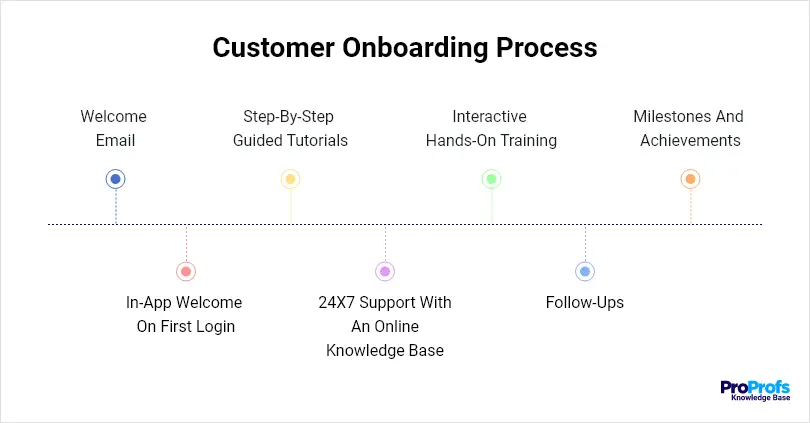
Use Case and Real-Life Examples
Let’s see some real-world examples where an AI chatbot for website is at play:
1. Proactive Customer Support
Instead of waiting for customers to reach out with issues, AI chatbot for website can proactively engage users who may be experiencing difficulties based on their actions or inactions on the website.
Example: Shopify uses an AI chatbot for website to monitor user activity on its platform. If a user seems stuck while setting up their online store or is repeatedly visiting help pages, the chatbot offers proactive assistance, asking if they need help or directing them to relevant resources.
Suggested Reading:9 Expert Tips for Effective Ecommerce Marketing Automation
2. Automated Follow-Ups and Feedback Collection
After a support interaction, following up to ensure the issue is resolved or to collect feedback can be crucial for customer satisfaction. AI chatbot for website can automate this process, sending follow-up messages or surveys at the right time.
Example: Airbnb employs an AI chatbot for website that follows up with users after their stay to collect feedback. The chatbot asks specific questions about their experience and offers assistance if any issues arose during their stay, allowing Airbnb to quickly address concerns and improve their service.
Personalized Marketing & Sales
AI chatbot for website offer a wealth of opportunities for personalized marketing and sales through the following means:
Behavioral Analysis: By observing user interactions and patterns, AI chatbot for website can tailor their responses and recommendations to match individual user preferences and interests.
Product Recommendations: Based on the insights gathered from user behavior, AI chatbot for website can suggest products or services that align with users’ needs, increasing the likelihood of converting interactions into sales.
Lead Nurturing: Through regular and contextually relevant communication, AI chatbot for website can nurture leads by providing the information needed to move them down the sales funnel.
Upselling and Cross-selling: With in-depth knowledge of the user’s past purchases and preferences, chatbots can effectively upsell or cross-sell related products or higher-tiered services.
Post-Sale Support: After a purchase, AI chatbot for website can continue to engage customers with support, tips, and complementary product suggestions, enhancing the customer experience and loyalty.
Real-life use cases and examples
Let’s see some real-world examples where an AI chatbot for website is at play :
1. Tailored Product Recommendations
AI chatbot for website can analyze customer behavior and preferences to provide personalized product recommendations, increasing the likelihood of conversion and enhancing the shopping experience.
Example: H&M uses an AI chatbot for website on its mobile app that asks customers about their style preferences and then recommends outfits tailored to their tastes.
2. Personalized Promotions and Discounts
AI chatbot for website can offer personalized discounts and promotions based on user behavior, purchase history, or even real-time events, increasing the effectiveness of marketing campaigns.
Example: Domino’s Pizza uses an AI chatbot for website that offers personalized deals to customers based on their order history. The chatbot can recognize when a customer hasn’t ordered in a while and offer a discount to entice them back, effectively driving repeat business.
Increase Engagement & Conversions
AI chatbot for website can significantly increase user engagement and conversion rates through various strategic implementations:
Instant Engagement: AI chatbot for website engage users the moment they visit your site or app, providing an immediate touchpoint and keeping users interested from the start.
Prompt Answers to Queries: By providing instant responses to questions, chatbots help reduce bounce rates due to uncertainties or unaddressed concerns, guiding potential customers closer to conversion.
Simplified Navigation: AI chatbot for website can guide users to their desired information or product, simplifying the user journey and reducing friction that may hinder conversions.
Lead Qualification: By asking targeted questions,AI chatbot for website can quickly qualify leads, ensuring that sales teams focus their efforts on prospects with the highest conversion potential.
Reduced Cart Abandonment: For e-commerce, AI chatbot for website can remind users of abandoned carts and offer discounts or help to complete the purchase, directly impacting conversion rates.
A/B Testing: AI chatbot for website can facilitate A/B testing of messages, offers, and conversation flows to find the most effective strategies for increasing engagement and conversions.
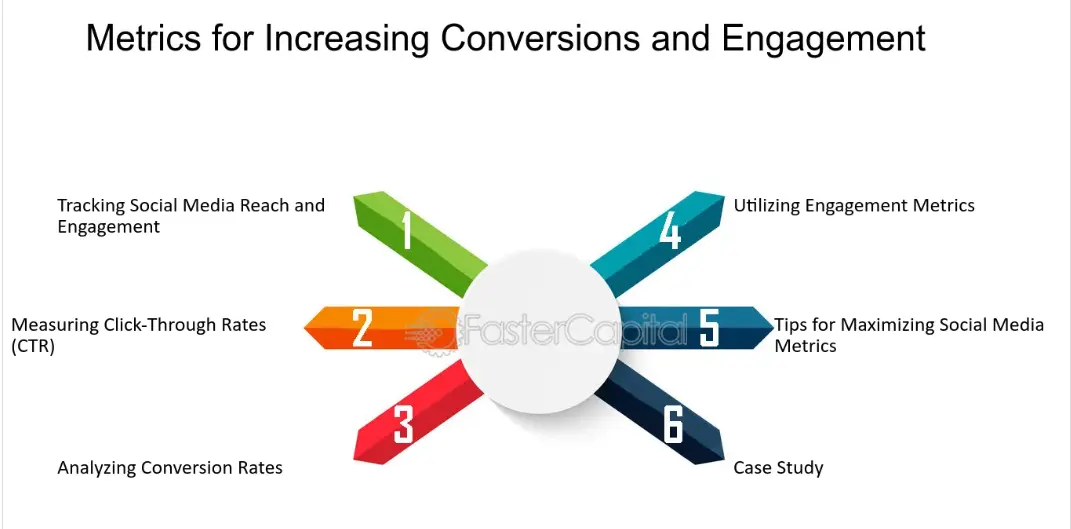
Real Life Use Case and Examples
Let’s explore real world examples where AI chatbot for website are at play:
1. Interactive Content and Quizzes
AI chatbot for website can engage users with interactive content like quizzes, polls, or games, making the experience more engaging and driving conversions by offering tailored recommendations based on user responses.
Example: BuzzFeed uses AI chatbot for website to create interactive quizzes that resonate with users’ interests. After completing a quiz, the chatbot recommends related content or products, effectively increasing user engagement and driving conversions through personalized suggestions.
2. Social Proof and User Reviews
AI chatbot for website can dynamically display social proof, such as user reviews or testimonials, when users are considering a purchase, helping to build trust and increase conversions.
Example: TripAdvisor employs an AI chatbot for website that highlights relevant user reviews when visitors are browsing hotel options. By showcasing positive experiences from other customers, the chatbot encourages users to complete their booking, thereby increasing conversions.
Data Collection & Insights
AI chatbot for website for websites can revolutionize data collection and insights gathering with their capabilities, enabling businesses to understand customer preferences and improve service delivery:
Automated Data Collection: AI chatbot for website can collect data from every interaction, obtaining valuable information such as user preferences, behaviors, and feedback without intrusive questionnaires.
Enhanced Customer Profiles: The data gathered from AI chatbot for website interactions can enrich customer profiles with more detailed preference and behavior information, resulting in improved customer segmentation and targeted marketing.
Sentiment Analysis: AI chatbot for website can analyze user sentiment through text inputs, helping businesses gauge customer satisfaction and detect areas requiring improvement.
Conversion Tracking: AI chatbot for website can track user actions leading to conversions, providing clear insights into what drives users to make purchasing decisions or engage more deeply with a brand.
Efficient Feedback Loop: Immediate feedback collected by AI chatbot for website from customers post-interaction or transaction can highlight strengths and pinpoint areas for service enhancement.
Real Life Use Case and Example
Let’s see some real-world examples where an AI chatbot for website is at play:
Behavioral Data Analysis
AI chatbot for website can track and analyze user interactions on a website, collecting data on behavior patterns, preferences, and pain points. This data can be used to optimize the user experience and refine marketing strategies.
Example: Netflix employs AI chatbot for website to monitor viewing habits, search queries, and user interactions. This data is then used to recommend personalized content to users and to understand trends that can influence future content development and marketing campaigns.
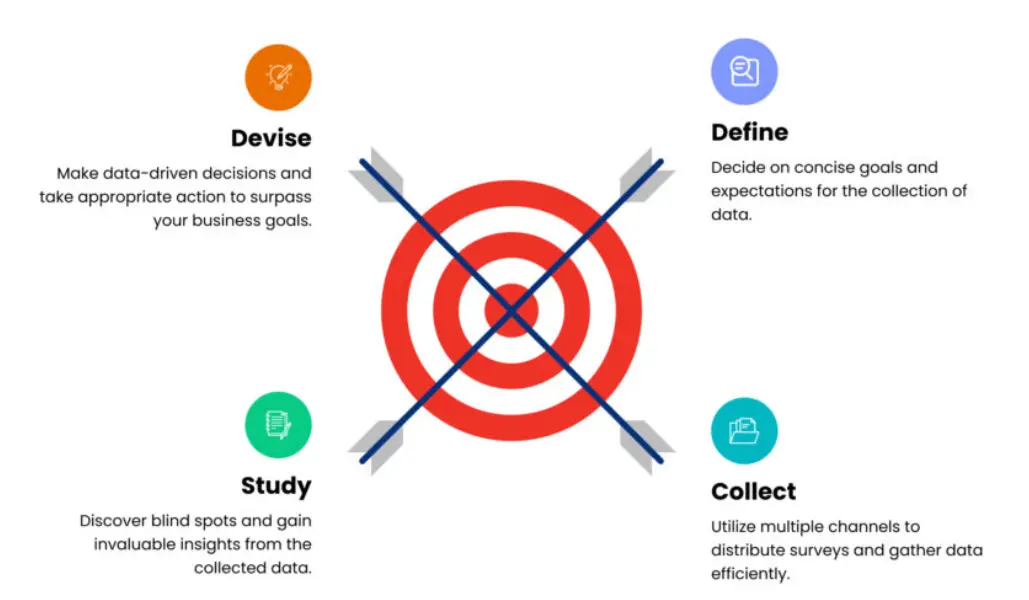
24/7 Availability & Global Reach
AI chatbot for website can drastically enhance a business's customer service and market presence through 24/7 availability and global reach. Here are key points that highlight these benefits:
No Time Zone Constraints: AI chatbot for website eliminate the limitation of time zones, providing a constant presence that caters to international customers at their convenience.
Reduced Operational Costs: By automating routine inquiries, AI chatbot for website reduce the workload on human agents and lower the costs associated with 24/7 human staff coverage.
Language and Localization: Advanced AI chatbot for website can be programmed to understand and communicate in multiple languages, making them ideal for global operations and reducing language barriers with customers.
After-Hours Support: AI chatbot for website can handle out-of-office queries, ensuring that customer support is continuous and that no queries go unanswered until the next business day.
Integration and Automation: AI chatbot for website can be integrated with various business tools and platforms, enabling a seamless experience for users and automated workflows that operate round-the-clock.
Through 24/7 availability and global reach, AI chatbot for website help businesses provide uninterrupted, quality customer service and expand their market presence effectively.
Conclusion
In conclusion, AI chatbots are not just helpful; they're essential. Marketing automation chatbots are the future of customer engagement and a must-have tool to maximize lead generation in today's digital landscape.
By integrating chatbots into your lead nurturing, sales, and support processes, you can deliver personalized interactions to your prospects 24/7 at scale. This helps you convert more leads into customers and increase your sales over time.
Among the various chatbot platforms available, BotPenguin stands out as the best option.
With a user-friendly interface and powerful lead capture, relationship nurturing, and CRM integration features, BotPenguin makes it easy to realize the full potential of chatbot marketing. The ability to generate valuable insights from customer data also enables highly optimized campaigns.
Lead generation is the lifeblood of any business, and BotPenguin's chatbot is a lead generation powerhouse. By capturing user information and qualifying leads in real time, the chatbot saves you valuable time and resources. At the end of the day, conversions are what drive your business forward. BotPenguin's chatbot plays a crucial role in boosting conversion rates.
So don't delay - start powering up your results with BotPenguin today!
Frequently Asked Questions (FAQs)
What is marketing automation with AI chatbots for websites?
Marketing automation using AI chatbots involves automating repetitive marketing tasks, like sending emails or chat responses, to engage visitors on websites with minimal human intervention, increasing efficiency and personalization.
Are there any particular platforms or tools recommended for creating an AI chatbot for marketing automation?
BotPenguin is highly recommended for its ease of use, customization options, and powerful integration capabilities, making it suitable for businesses looking to leverage AI chatbots.
Can AI chatbots handle multiple languages for global websites?
Yes, many AI chatbots offer multilingual support, which allows them to serve a global audience by interacting in multiple languages.
How can AI chatbots be integrated with existing marketing tools and platforms?
AI chatbots can be integrated with CRM systems, email marketing platforms, and analytics tools to streamline marketing processes and share valuable user data.
What metrics should be tracked to evaluate the effectiveness of an AI chatbot in marketing automation?
Key metrics include user engagement rate, lead generation rate, conversion rate, bot interaction time, and customer satisfaction scores.

